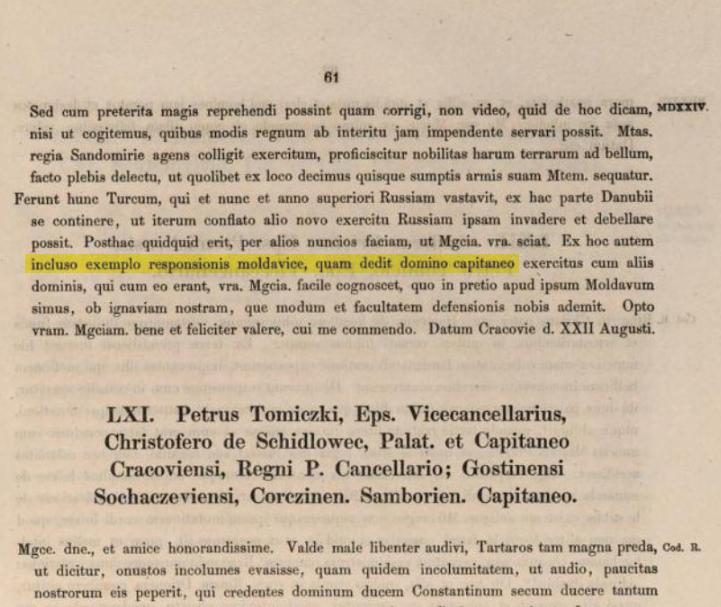I try to translate the following text: 1524, "Acta Tomiciana: epistole, legationes, responsa, actiones, res geste Sigismundi I Regis Poloniae", Volume 7
"Sed cum preterita magis reprehendi possint quam corrigi, non video, quid de hoc dicam, nisi ut cogitemus, quibus modis regnum ab interitu jam impendente servari possit. Mtas. regia Sandomirie agens colligit exercitum, proficiscitur nobilitas harum terrarum ad bellum, facto plebis delectu, ut quolibet ex loco decimus quisque sumptis armis suam Mtem. sequatur. Ferunt hunc Turcum, qui et nunc et anno superiori Russiam vastavit, ex hac parte Danubii se continere, ut iterum conflato alio novo exercitu Russiam ipsam invadere et debellare possit. Posthac quidquid erit, per alios nuncios faciam, ut Mgcia. vra. sciat. Ex hoc autem incluso exemplo responsionis moldavice, quam dedit domino capitaneo exercitus cum aliis dominis, qui cum eo erant, vra. Mgcia. facile cognoscet, quo in pretio apud ipsum Moldavum simus, ob ignaviam nostram, que modum et facultatem defensionis nobis ademit. Opto vram. Mgciam. bene et feliciter valere, cui me commendo. Datum Cracovie d. XXII Augusti "
especially this
Posthac quidquid erit, per alios nuncios faciam, ut Mgcia. vra. sciat. Ex hoc autem incluso exemplo responsionis moldavice, quam dedit domino capitaneo exercitus cum aliis dominis, qui cum eo erant, vra. Mgcia. facile cognoscet, quo in pretio apud ipsum Moldavum simus, ob ignaviam nostram, que modum et facultatem defensionis nobis ademit.
"responsionis moldavice" does it mean the "answer in moldovan [language]", or "answer from Moldova"? And what is the exact translation, because Google translates something incomprehensible :)
